| Listing 1 - 9 of 9 |
Sort by
|
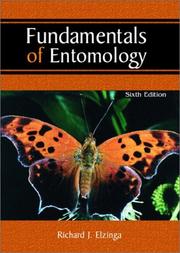
ISBN: 0130480304 Year: 2004 Publisher: Upper Saddle River Pearson
Abstract | Keywords | Export | Availability | Bookmark
 Loading...
Loading...Choose an application
- Reference Manager
- EndNote
- RefWorks (Direct export to RefWorks)
Entomology. --- Entomologie --- 595.7 --- Insecta (Hexapoda). Insects. Entomology --- 595.7 Insecta (Hexapoda). Insects. Entomology --- Entomology --- Insects --- Zoology
Periodical
Abstract | Keywords | Export | Availability | Bookmark
 Loading...
Loading...Choose an application
- Reference Manager
- EndNote
- RefWorks (Direct export to RefWorks)
" ... promotes the study of the biology, ecology, taxonomy and control of insects and arachnids."
Insects --- Arachnida --- Entomology --- Arachnida. --- Entomology. --- Insects. --- Hexapoda --- Insecta --- Pterygota --- Arachnids --- Arthropoda --- Zoology --- Entomologie --- Zoologie
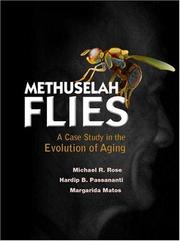
ISBN: 128188071X 9786611880712 9812567224 9789812567222 9781281880710 9812387412 9789812387417 Year: 2004 Publisher: River Edge, N.J. World Scientific
Abstract | Keywords | Export | Availability | Bookmark
 Loading...
Loading...Choose an application
- Reference Manager
- EndNote
- RefWorks (Direct export to RefWorks)
Methuselah Flies presents a trailblazing project on the biology of aging. It describes research on the first organisms to have their lifespan increased, and their aging slowed, by hereditary manipulation. These organisms are fruit flies from the species Drosophila melanogaster, the great workhorse of genetics. Michael Rose and his colleagues have been able to double the lifespan of these insects, and improved their health in numerous respects as well. The study of these flies with postponed aging is one of the best means we have of understanding, and ultimately achieving, the postponement of aging in humans. As such, the carefully presented detail of this book will be of value to research devoted to the understanding and control of aging. Methuselah Flies: is a tightly edited distillation of twenty years of work by many scientists; contains the original publications regarding the longer-lived fruit flies; offers commentaries on each of the topics covered - new, short essays that put the individual research papers in a wider context; gives full access to the original data; captures the scientific significance of postponed aging for a wide academic audience.
Drosophila --- Insects --- Hexapoda --- Insecta --- Pterygota --- Arthropoda --- Entomology --- Drosophilidae --- Fruit-flies --- Aging.
Book
ISBN: 1107143543 1280540109 9786610540105 0511214499 0511216289 0511210914 0511315155 0511542666 0511212682 Year: 2004 Publisher: Cambridge, UK ; New York : Cambridge University Press,
Abstract | Keywords | Export | Availability | Bookmark
 Loading...
Loading...Choose an application
- Reference Manager
- EndNote
- RefWorks (Direct export to RefWorks)
Chemical signals mediate all aspects of insects' lives and their ecological interactions. The discipline of chemical ecology seeks to unravel these interactions by identifying and defining the chemicals involved, and documenting how perception of these chemical mediators modifies behaviour and ultimately reproductive success. Chapters in this 2004 volume consider how plants use chemicals to defend themselves from insect herbivores; the complexity of floral odors that mediate insect pollination; tritrophic interactions of plants, herbivores, and parasitoids and the chemical cues that parasitoids use to find their herbivore hosts; the semiochemically mediated behaviours of mites; pheromone communication in spiders and cockroaches; the ecological dependency of tiger moths on the chemistry of their host-plants; and the selective forces that shape the pheromone communication channel of moths. The volume presents descriptions of the chemicals involved, the effects of semiochemically mediated interactions on reproductive success, and the evolutionary pathways that have shaped the chemical ecology of arthropods.
Insects --- Chemical ecology. --- Animal chemical ecology. --- Animal ecology --- Chemical ecology --- Hexapoda --- Insecta --- Pterygota --- Arthropoda --- Entomology --- Ecophysiology.

ISBN: 0854046917 9781847550262 1847550266 9780854046911 Year: 2004 Publisher: Cambridge Royal Society of Chemistry
Abstract | Keywords | Export | Availability | Bookmark
 Loading...
Loading...Choose an application
- Reference Manager
- EndNote
- RefWorks (Direct export to RefWorks)
Insecta --- Sécrétion --- Secretion --- body fluids --- Biosynthesis --- chemical structure --- Metabolites --- Animal physiology --- 595.7 --- 595.7 Insecta (Hexapoda). Insects. Entomology --- Insecta (Hexapoda). Insects. Entomology --- Insects --- Biological synthesis --- Synthesis, Biological --- Biochemical engineering --- Biochemistry --- Organic compounds --- Biochemical templates --- Physiology --- Synthesis --- Secretion. --- Synthetic biology
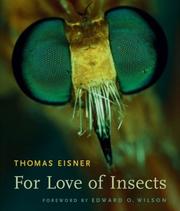
ISBN: 0674011813 0674018273 Year: 2004 Publisher: Cambridge : The Belknap Press of Harvard University Press,
Abstract | Keywords | Export | Availability | Bookmark
 Loading...
Loading...Choose an application
- Reference Manager
- EndNote
- RefWorks (Direct export to RefWorks)
595.7 --- Insecta (Hexapoda). Insects. Entomology --- 595.7 Insecta (Hexapoda). Insects. Entomology --- Entomology --- Insects --- 502 --- Hexapoda --- Insecta --- Pterygota --- Arthropoda --- Zoology --- 502 Nature. Nature study and conservation. Nature and wildlife protection --- Nature. Nature study and conservation. Nature and wildlife protection --- Insects. Springtails
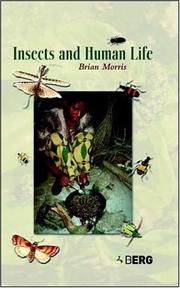
ISBN: 1859738478 1845200756 9781859738474 9781845209490 1845209494 9781474214957 1474214959 9781845200756 1282545523 9781282545526 9786612545528 6612545526 9781000189810 1000189813 9781003085713 1003085717 1000183181 9781000186697 1000186695 9781000183184 Year: 2004 Publisher: Oxford Berg
Abstract | Keywords | Export | Availability | Bookmark
 Loading...
Loading...Choose an application
- Reference Manager
- EndNote
- RefWorks (Direct export to RefWorks)
This pioneering book looks at the importance of insects to culture. While in the developed West a good deal of time and money may be spent trying to exterminate insects, in other cultures human-insect relations can be far more subtle and multi-faceted. Like animals, insects may be revered or reviled - and in some tribal communities insects may be the only source of food available. How people respond to, make use of, and relate to insects speaks volumes about their culture. In an effort to get to the bottom of our vexed relationship with the insect world, Brian Morris spent years in Malawi, a country where insects proliferate and people contend. In Malawi as in many tropical regions, insects have a profound impact on agriculture, the household, disease and medicine, and hence on oral literature, music, art, folklore, recreation and religion. Much of the complexity of human-insect relations rests on paradox: insects may represent the source of contagion, but they are also integral to many folk remedies for a wide range of illnesses. They may be at the root of catastrophic crop failure, but they can also be a form of sustenance.Weaving science with personal observations, Morris demonstrates a profound and intimate knowledge of virtually every aspect of human-insect relations. Not only is this book extraordinarily useful in terms of the more practical side of entomology, it also provides a wealth of information on the role of insects in cultural production. Malawian proverbs alone provide many such delightful examples - 'Bemberezi adziwa nyumba yake' ('The carpenter bee knows his own home'). This final volume in Morris' trilogy on Malawi's animal and insect worlds is certain to become a classic study of uncharted territory - the insect world that surrounds us and how we relate to it. Praise for The Power of Animals:Although based upon examination of a single culture, Morris incorporates ecological and anthropological concepts that expand this study of
Entomology --- Biodiversity --- Useful insects --- Food resources --- Human feeding --- Apiculture --- apiculture --- Stored products pests --- pests of plants --- Forest pests --- Vectors --- Social anthropology --- Heteroptera --- Apidae --- Termitidae --- Acrididae --- Noctuidae --- Formicidae --- Beneficial insects --- Insect pests --- Malawi --- Africa --- apiculture. --- Insects --- Hexapoda --- Insecta --- Pterygota --- Arthropoda --- Destructive insects --- Economic entomology --- Entomology, Economic --- Injurious insects --- Insects, Injurious and beneficial --- Arthropod pests --- Veterinary entomology --- Insects, Beneficial --- Zoology, Economic --- Ecology
Periodical
ISSN: 1559324X Year: 2004 Publisher: Berkeley, Calif. : University of California Press,
Abstract | Keywords | Export | Availability | Bookmark
 Loading...
Loading...Choose an application
- Reference Manager
- EndNote
- RefWorks (Direct export to RefWorks)
Entomology. --- Entomology --- Insects. --- California. --- Hexapoda --- Insecta --- Pterygota --- Alta California --- CA --- Cal. --- Cali. --- CF --- Chia-chou --- Departamento de Californias --- Kʻaellipʻonia --- Kʻaellipʻonia-ju --- Kʻaellipʻoniaju --- Kalifornii --- Kalifornii︠a︡ --- Kalifornija --- Ḳalifornyah --- Ḳalifornye --- Kālīfūrniyā --- Kaliphornia --- Karapōnia --- Kariforunia --- Kariforunia-shū --- Medinat Ḳalifornyah --- Politeia tēs Kaliphornias --- Provincia de Californias --- Shtat Kalifornii︠a︡ --- State of California --- Upper California --- Arthropoda --- Insects --- Zoology --- Alta California (Province) --- Kalifornii͡ --- Kālīfūrniy --- Kariforunia-sh --- Shtat Kalifornii͡ --- Californias (Province)
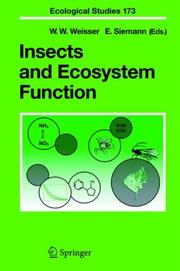
ISBN: 354074004X 3540216723 3540740031 Year: 2004 Volume: vol. 173 Publisher: Berlin Springer
Abstract | Keywords | Export | Availability | Bookmark
 Loading...
Loading...Choose an application
- Reference Manager
- EndNote
- RefWorks (Direct export to RefWorks)
In the past two decades, an increasing number of ecologists have started to investigate the importance of biodiversity for ecological processes such as energy flow and nutrient cycling, often referred to as 'ecosystem functioning'. Insects are a dominant component of biodiversity in terrestrial ecosystems and play a key role in mediating the relationship between plants and ecosystem processes. This volume is the first to summarize their effects on ecosystem functioning, focusing mainly, but not exclusively, on herbivorous insects. Renowned authors with extensive experience in the field of plant-insect interactions, contribute to the volume using examples from their own work. In addition to providing concise reviews of the field, this volume discusses in detail the advantages and disadvantages of various techniques of manipulating insect herbivory. Thus, the text provides both a theoretical basis as well as practical advice for future manipulative studies of biodiversity-ecosystem functioning.
Ecosystem. --- Insects -- Ecology. --- Science. --- Insects --- Invertebrates & Protozoa --- Ecology --- Zoology --- Earth & Environmental Sciences --- Health & Biological Sciences --- Ecology. --- Life sciences. --- Animal ecology. --- Biodiversity. --- Ecosystems. --- Plant ecology. --- Community ecology, Biotic. --- Invertebrates. --- Life Sciences. --- Animal Ecology. --- Plant Ecology. --- Community & Population Ecology. --- 574.4 --- 591.5 --- 595.7 --- 574.4 Terrestrial biocoenoses and ecosystems. Biogeocoenoses. Biogeochemical cycles. Food chains --- Terrestrial biocoenoses and ecosystems. Biogeocoenoses. Biogeochemical cycles. Food chains --- 591.5 Animal habits. Animal behaviour. Ecology. Ethology. Animal and environment. Bionomy --- Animal habits. Animal behaviour. Ecology. Ethology. Animal and environment. Bionomy --- 595.7 Insecta (Hexapoda). Insects. Entomology --- Insecta (Hexapoda). Insects. Entomology --- Invertebrata --- Animals --- Biocenoses --- Biocoenoses --- Biogeoecology --- Biological communities --- Biomes --- Biotic community ecology --- Communities, Biotic --- Community ecology, Biotic --- Ecological communities --- Ecosystems --- Natural communities --- Population biology --- Botany --- Plants --- Biological diversification --- Biological diversity --- Biotic diversity --- Diversification, Biological --- Diversity, Biological --- Biology --- Biocomplexity --- Ecological heterogeneity --- Numbers of species --- Biosciences --- Sciences, Life --- Science --- Insectes --- Ecologie --- Endangered ecosystems. --- Balance of nature --- Bionomics --- Ecological processes --- Ecological science --- Ecological sciences --- Environment --- Environmental biology --- Oecology --- Environmental sciences --- Threatened ecosystems --- Biotic communities --- Nature conservation --- Phytoecology --- Vegetation ecology --- Floristic ecology --- Animal migration. --- Biotic communities. --- Population biology. --- Animal Migration. --- Experimental Organisms. --- Community and Population Ecology. --- Technique. --- Migration of animals --- Animal behavior --- Zoogeography --- Migratory animals --- Migration
| Listing 1 - 9 of 9 |
Sort by
|

 Search
Search Feedback
Feedback About UniCat
About UniCat  Help
Help News
News